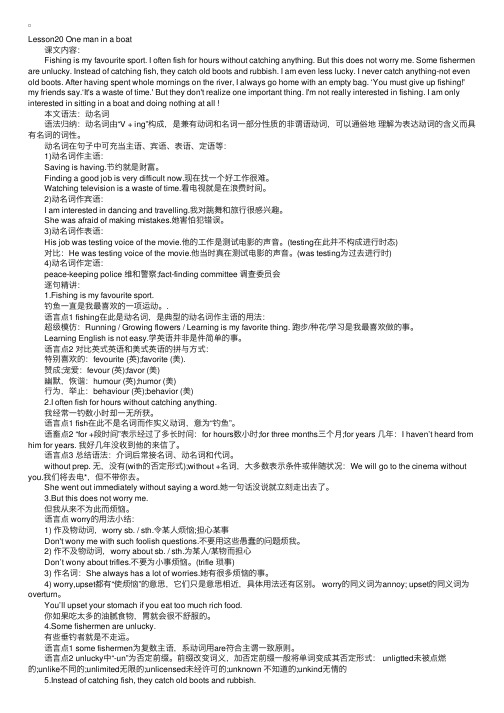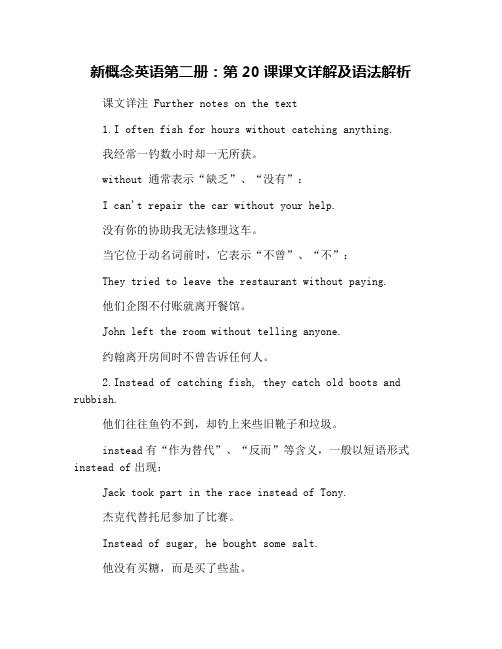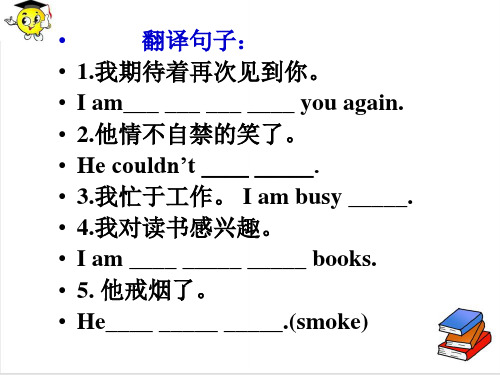新概念英语第二册:第20课课文详解及语法解析.doc
新概念英语第二册第二十课课后习题答案详解 Lesson

新概念英语第二册第二十课课后习题答案详解Lesson 201. b根据课文第4行 I never catch anything---not even old boots, 只有 b. nevercatches anything 与课文实际内容相同,而其他3个选择都与课文内容不符。
根据课文最后一句I am only interested in sitting in a boat and doing nothingat all! 只有c. doing nothing 是正确答案,而其他3个选择都不符合课文内容。
本句是对主语提问的,回答是. who (谁)是对主语提问的;c. whom(谁)是对宾语提问的;d. whose(谁的)确是对定语提问的;只有b. which 是对做主语的事物提问的,所以选b.本句是带never的否定句,只有b. anything 可以用在否定句中。
而a. nothing若用在否定句中,就会使原句变成肯定意义的句子,不符合题目意思;c. something 只能用于肯定句中;d. everything 也不能用在否定句中。
前面句子 I am even less lucky 中的 less(不及)是表示否定意义的比较级,只有c. not so是表示否定意义的,而其他3个选择都没有否定的意思.只有b. an empty bag 最符合语法。
而其他3个选择都有语法错误。
a. a empty bag 中empty是以元音开头的,前面不能用a 而应该用an; c. empty bag 中 bag 是可数名词,需要用an 来修饰;d. oneempty bag 不符合习惯用法,单数可数名词前通常用不定冠词a 或an 修饰,除非表示强调才用one 修饰。
因此应该选b.只有c. all 才能使这个句子同前一句I am only interested in doingnothing.的含义相符合,all等于the things that ,可以代替doing nothing. 而其他3个选择中a. only 和d. the only 不符合语法,b. the one 不符合题目意思,不能完全表达清楚。
新概念第二册第20课完整ppt课件

【课文讲解】 Fishing is my favourite sport. 动词+ing(动名词):1.做主语;2.做宾语 favourite adj. 最喜欢的 无比较级,最高级 Red and Black is my favourite book. n. 心爱的人(物) ,最喜爱的东西 That song is one of his favourites. She is a favourite with her aunt. =She is her aunt’s favourite.
精选ppt
Instead of catching fish, they catch old boots and rubbish. instead of 不做…而做… (可置于句首或句尾) without强调没有做某件事,instead of强调这件事
没做成而做成了另外一件事 我原准备做……但是后来做了…… I go to school instead of staying at home. I bought books instead of buying dresses. instead of +n./ pron./v.-ing
用法:without前后必须保持一致。
Fish can not live without water. But this does not worry me. worry v. 使…担心
worry sb.使…担心 困扰某人 My little daughter worried me a lot. be worried about 对…感到担心 I was worried about my little daughter.
(本句主从句主语不一致,不可省略成 after doing 形式)
逐句精讲新概念英语第二册:第20课独坐孤舟

Lesson20 One man in a boat 课⽂内容: Fishing is my favourite sport. I often fish for hours without catching anything. But this does not worry me. Some fishermen are unlucky. Instead of catching fish, they catch old boots and rubbish. I am even less lucky. I never catch anything-not even old boots. After having spent whole mornings on the river, I always go home with an empty bag. ‘You must give up fishing!' my friends say.‘It's a waste of time.' But they don't realize one important thing. I'm not really interested in fishing. I am only interested in sitting in a boat and doing nothing at all ! 本⽂语法:动名词 语法归纳:动名词由“V + ing”构成,是兼有动词和名词⼀部分性质的⾮谓语动词,可以通俗地理解为表达动词的含义⽽具有名词的词性。
动名词在句⼦中可充当主语、宾语、表语、定语等: 1)动名词作主语: Saving is having.节约就是财富。
Finding a good job is very difficult now.现在找⼀个好⼯作很难。
Watching television is a waste of time.看电视就是在浪费时间。
新概念英语第二册20课

●LESSON 201.生词与短语1)catch表示捉到的时候,还可以用:grab,seize,hold,take hold of等等Catch fish 钓鱼,捕鱼Catch thief 抓住小偷Catch the bus 赶公共汽车→miss the bus 错过公共汽车catch one’s attention Catch one’s eyesdraw one’s attention Draw one’s eyes }吸引某人注意力attract one’s attention Attract one’s eyescatch fire 燃烧,着火(强调动作)be on fire 燃烧着的,着火的(强调状态)Catch a cold 患感冒(强调动作)Have a cold 患感冒(强调状态)Catch sb. doing sth 抓住某人正在做某事Eg. The little boy was caught stealing apples from the garden.这个小男孩正在偷苹果被.抓住了。
Eg. The early bird catches the worms. 早起的鸟儿能捕到虫子。
(谚语的实际含义:捷足先登)【同义词区分】grab 抓起,抢夺,热切或拼命地抓snatch 抢夺,突然而迅速地抓起arrest (依法)逮捕capture 俘虏,捕获trap 设陷阱捕捉grasp 握紧,抓住seize 握紧,抓住catch it 被责骂,受处罚【口】(常与will等连用)Eg. If I come home late , I’ll catch it from my mother. 如果我回家晚了,妈妈会骂我的。
catch up with 赶上(某人)eg. Go ahead , please. I’ll soon catch up with you.Catch on (意见,时尚)受欢迎的Catch phrase 标语,引人注目的句子2)fishFish →fishman (pl. fishmen)Fish 鱼(c.)n..⑴fish 鱼(pl.)单复数头同形⑵fish 不同种类的鱼A big fish in a small pond. 一个小池塘里的大鱼(中文寓意:山中无老虎,猴子称霸王)Eg. When the cat is away, the mice will play.当猫不在的时候,老鼠就开始玩儿了。
新概念英语第二册:第20课课文详解及语法解析

新概念英语第二册:第20课课文详解及语法解析课文详注 Further notes on the text1.I often fish for hours without catching anything.我经常一钓数小时却一无所获。
without 通常表示“缺乏”、“没有”:I can't repair the car without your help.没有你的协助我无法修理这车。
当它位于动名词前时,它表示“不曾”、“不”:They tried to leave the restaurant without paying.他们企图不付账就离开餐馆。
John left the room without telling anyone.约翰离开房间时不曾告诉任何人。
2.Instead of catching fish, they catch old boots and rubbish.他们往往鱼钓不到,却钓上来些旧靴子和垃圾。
instead有“作为替代”、“反而”等含义,一般以短语形式instead of出现:Jack took part in the race instead of Tony.杰克代替托尼参加了比赛。
Instead of sugar, he bought some salt.他没有买糖,而是买了些盐。
副词instead单独使用时一般出现在句尾:If you don't want a holiday in England, why don't you go to Australiainstead?如果你不想在英国度假,那你为什么不去澳大利亚呢?3.I am even less lucky.我的运气甚至还不及他们。
less是little的比较级,意为“不及”、“不如”、“更少”:Tom has got little chocolate, and Jack has got even less.汤姆只有一点儿巧克力,杰克则更少。
新概念英语第二册 lesson20 绝对实用

Some useful expressions
My favorite sport
Playing football is my favourite sport. I first became interested in football when I was nine. Now I play in my school team and join my friends for a game every week on a regular basis. It’sou must give up ______ friends say. “It’s a ______ waste of time.” But they don’t ______ realize one important thing. I’m not really _________ interested in fishing. I am only sitting in a boat and interested in _______ doing ________ nothing at all!
What is the writer’s favourite sport? Fishing is my favourite sport. I often fish for hours without… I often fish for hours without catching anything. Does this worry you? But this does not worry me. What about some fishermen? Some fishermen are unlucky. What do they catch? Instead of catching fish, they catch old boots and rubbish.
新概念英语第二册Lesson20

Lesson 20 One man in a boat【New words and expressions】生词和短语★catch v. 抓到 catch fish, catch thief catch cold:染上感冒 catch a bus:赶车catch one's breath:摒住呼吸 catch sight of(see):看见catch fire:着火 catch one's eyes:吸引某人注意力★fisherman n. 钓鱼人,渔民★boot n.靴子 a pair of boots★waste n. v. 浪费 You are wasting time.a waste of: It is a waste of time.★realize v. 意识到 I realized that I was wrong.实现,realize one's dream【课文讲解】fish一般情况下作为不可数名词用There are a lot of fishes(表示种类)in the sea.fish(v.):钓鱼,捕鱼主语通常由名词和代词充当,以及动词+ingfor+时间……表示一段时间 for hours=for some hourswithout (prep.) 介词后面一定要加宾语动词+ing:1.做主语;2.做宾语anything用在否定句中without作为状语而出现,表示结果状语, without 后面的动作是主语来做.He went out without saying any words.Without asking for money, the boy went to school.(v.)worry sb. The house worried me. My daughter worried me.(adj.)be worried about 主语为宾语而感到担心I was never worried about this.instead of 后面的词一定是没有做的,可以放在主句后面without强调没有做某件事,instead of强调这件事没做成而做成了另外一件事我原准备做……但是后来做了……I go to school instead of staying at home. I bought books instead of buying dresses. less+原级 (不如) : A is less ... than Bspend+时间+在某地:在某地度过……时间after(conj.)+从句,从句主语必须是主句的主语才能换成下面一种形式after(prep.)+名词/动词的ing形式After I go to school, I learned a lot of knowledge.After going to school, I learned a lot of knowledge.with: 带着 without;没带give up doing/stop doing:放弃做某事在船上in the boatnot at all在否定句中起强调作用【Key structures】动词+ing(非谓语动词)可以做主语和宾语b.be keen on, be fond of, be interested in, enjoy+动词ingbe afraid of, be up to ,be capable of, without, instead ofc. I apologize.apologize for (not) doing sth., thank you for..., congratulate sb. on doing sth. Exercises C1.without without prep.+ doingHe went out of the restaurant without paying the bill.2.instead ofShe bought a pair of boots instead of getting a pair of shoes.=She bought a pair of boots instead of a pair of shoes.3.of : She was afraid of spending the night alone.4.afterafter+从句;after prep.+doing After hearing the news, she fainted.5.beforeThink carefully before answering my question. 在回答我的问题之前,请仔细考虑。
新概念英语第二册Lesson20课件

much / a lot a little/ a bit even
更…
…一点 甚至
He is a tle taller than Tom.
He is much taller than you.
I never catch anything-not even old boots. 频率副词: always(总是)>usually(通常)>often(经常) >somtimes(有时)>hardly ever (几乎不) >never(从不)
I can’t repair the car without your help. They tried to leave the hotel without paying.
But this does not worry me. 但是我从不为此烦恼。
worry ① v. 烦恼,担扰
worry sb. 某人为……烦恼 (作动词一定要加人作宾语, 翻译时从后往前 翻,宾语担心)
catch a cold 患感冒
★ waste ① n. 浪费
a waste of… 浪费……
eg. It is a waste of time/money/water. 句型扩展:
It's a waste of time to do sth. 做…是浪费时间的。 ② vt. 浪费
eg. You are wasting time.
I am even less lucky. less是little的比较级,意为“不及,不如,更少”
I spend less time on English than on French. A is less…than B A不如B
- 1、下载文档前请自行甄别文档内容的完整性,平台不提供额外的编辑、内容补充、找答案等附加服务。
- 2、"仅部分预览"的文档,不可在线预览部分如存在完整性等问题,可反馈申请退款(可完整预览的文档不适用该条件!)。
- 3、如文档侵犯您的权益,请联系客服反馈,我们会尽快为您处理(人工客服工作时间:9:00-18:30)。
新概念英语第二册:第20 课课文详解及语法解析课文详注 Further notes on the text
1.I often fish for hours without catching anything.
我经常一钓数小时却一无所获。
without通常表示“缺乏”、“没有”:
I can't repair the car without your help.
没有你的协助我无法修理这车。
当它位于动名词前时,它表示“不曾”、“不”:
They tried to leave the restaurant without paying.
他们企图不付账就离开餐馆。
John left the room without telling anyone.
约翰离开房间时不曾告诉任何人。
2.Instead of catching fish, they catch old boots and rubbish.
他们往往鱼钓不到,却钓上来些旧靴子和垃圾。
instead 有“作为替代”、“反而”等含义,一般以短语形式instead of 出现:
Jack took part in the race instead of Tony.
杰克代替托尼参加了比赛。
Instead of sugar, he bought some salt.
他没有买糖,而是买了些盐。
副词 instead单独使用时一般出现在句尾:
If you don't want a holiday in England, why don't you go to Australia
instead?
如果你不想在英国度假,那你为什么不去澳大利亚呢?
3.I am even less lucky.
我的运气甚至还不及他们。
less是little的比较级,意为“不及”、“不如”、“更少”:
Tom has got little chocolate, and Jack has got even less.
汤姆只有一点儿巧克力,杰克则更少。
I spend less time on English than on French.
我花在英语上的时间比花在法语上的少。
(cf.第8课语法)
4.I always go home with an empty bag.
然后空着袋子回家。
with能够表示“有的”、“持有的”、“随身带着”
等:
Who's the man with the umbrella?
那个带伞的男人是谁 ?
Who's the man with the beard?
那个留胡子的男人是谁 ?
Who's the woman with the little boy?
带着那个小男孩的女人是谁?
5.I'm not really interested in fishing.
我并不是真的对钓鱼有兴趣。
表示“对感兴趣”一般用 be interested in sth. /doing
sth. :
Tim is only interested in food.
蒂姆只对食物感兴趣。
I'm interested in collecting stamps.
我对集邮有兴趣。
语法 Grammar in use
动名词 (The Gerund)(1)
动名词和现在分词的形式完全一样,都是由动词 +-ing 构成。
- ing 形式作名词时称为动名词。
从广义上讲,动名词能够代替名词,
即使它像动词一样可带宾语。
像名词一样,它能够作主语:
Dancing is fun. I love it.
跳舞有意思,我喜欢跳舞。
Walking quickly is difficult.
走快是很难的。
( 动名词 +副词作主语 )
Washing the car makes him dirty.
擦洗汽车把他身上弄脏了。
( 动名词 +宾语作主语 )
动名词也能够作宾语或介词宾语:
Mary is keen on cooking.
玛丽热衷于烹调。
( 介词宾语 )
Congratulations on passing your exams!
祝贺你通过考试 !
能够带动名词的介词通常有before, after, instead of,
without 等。
用介词 +动名词结构能够将两个短句合为一句话,或者将一个从句变为动名词结构。
动名词的否定式是在它前面直接加not :
Tom always knocks before entering a room.
汤姆在走进一个房间前总要敲门。
He apologized for not writing to you.
他为没给你写信而表示道歉。
动名词也能够用表示完成时的having +过去分词结构:
You can't leave the restaurant without having paid the
bill.
在没有付账之前你不能离开饭店。
